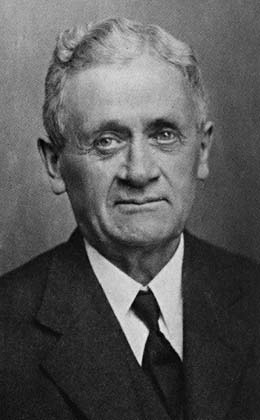Volume 7, number 2
January 27, 2003
David Toews was a ‘Mennonite Moses’
Photo: David Toews
 Helmut Harder, David Toews Was Here: 1870-1947. CMBC, 2002.
Helmut Harder, David Toews Was Here: 1870-1947. CMBC, 2002.
It is true. David Toews was “here.” He risked signing the contract that allowed my newly-married parents to come to Canada in 1924. With the help of the General Conference Home Mission Board, of which Toews was a member for 27 years, he “called” my grandfather, Franz F. Enns, who arrived in 1926, to itinerant ministry among the immigrants from Russia.
The book provides a more detailed account than I have seen anywhere of the disastrous December 13, 1926 fire in which my grandfather jumped from the upstairs window of the Toews house. There are many fascinating episodes in this book and readers will find their own connections to the story.
The book is basically chronological, with the first seven chapters following Toews to the places he lived: to Lysanderhöhe in Samara, Russia, and to Turkestan; to Kansas, Gretna and Winnipeg, and then to Tiefengrund, Eigenheim and Rosthern.
Rosthern became Toews’ home base for 41 years, well over half of his years of public ministry. This leadership in hitherto unknown contexts becomes the focus of the remaining chapters.
While Toews is seen as an “educator, religious leader, organizer, colonizer,” the most compelling image the author presents is of Toews as a “Mennonite Moses.” This representation follows Toews not only as chair of the Board of Immigration and Colonization, but also as chair of the Conference of Mennonites in Canada, member on the GC Home Mission Board, at Mennonite World Conference, working at settlement and relief, and relating to government.
As an educator and church leader himself, the author is well qualified to interpret the meaning of the leadership given by David Toews. There is ample content for reflection and discussion. Accomplishments and failures, disappointments and rewards are sensitively laid bare.
The author repeatedly gives credit to those without whom Toews could never have accomplished all he did, especially his wife Margarete and family.
The value of this warm and engaging story outweighs any suggestions for improvement there may be (such as an index). Through this book, David Toews, a deeply humble and committed man, faithful servant of his people, continues to be “here.”
—Anna Ens
Arts Notes
Visual arts collective
“The Mennonite Artists” is a collective of four young artists in Ontario who hope to raise the profile of contemporary Mennonite visual arts. The group includes Karim Awad, Paul Janzen, David Lobe and Matthew Tiessen. Their impetus is the sense that visual artists have few outlets within “aurally-centred” Mennonite communities. Based in Waterloo Region, they are also aware that Mennonites are regarded as “horse-and-buggy riders” rather than painters and photographers. The group wants to create an outlet for visual expression as well as for discussions about what it means to be Mennonite in today’s cultural landscape. The four are currently exhibiting their work at the Kuntz House Art Gallery in Waterloo and are scheduled for an exhibition in March at the Walper Terrace Hotel in Kitchener. A website is in the works at www.themennoniteartists.com. For more information, e-mail: matthewtiessen@yahoo.ca.
Signs & Symbols
Great is the company...
Sometimes I get tired of Handel’s Messiah, but it’s a Christmas tradition in my family, and every performance offers something new. This year, the unexpected came from a comment about the text.
My son, who performed the work with the Kitchener-Waterloo Philharmonic Choir in December, came home from rehearsal one day with the information that the familiar chorus: “The Lord gave the word: Great was the company of the preachers,” should really read, “Great was the company of the women.” I checked it out.
The text is Psalm 68:11. Some versions of the Bible note the variant reading in a footnote while others indeed have women proclaiming the good news of the Lord’s coming. The American Standard Version says: “The Lord gives the command; the women who proclaim the good tidings are a great host.” The New Living Translation states: “The Lord announced victory, and throngs of women shout the happy news.” (The New English Bible has the awkward wording: “The sovereign master speaks, many, many women spread the good news.”)
Even if the gender of the messengers is just a grammatical judgment call (feminine noun in the Hebrew), having women herald God’s coming places this text within the rich biblical tradition of women who celebrate God’s mighty acts: Miriam in Exodus 15, Hannah in I Samuel 2, and Mary in Luke 1, as well as the women who first announce Christ’s resurrection.
The familiar themes of these women’s songs—how God will vanquish the enemy and turn the established order upside down—also appear in Psalm 68: “Let God arise, let his enemies be scattered.... Father of the fatherless and protector of widows is God in his holy habitation. God gives the desolate a home to dwell in; he leads out the prisoners to prosperity....”
God puts down the powerful and raises up the lowly; God sends away the privileged and fills the hungry with good things—that’s what Mary said.
—Margaret Loewen Reimer
Copyright for the contents of this page belongs to the Canadian Mennonite. Please seek permission to reprint from the editor .